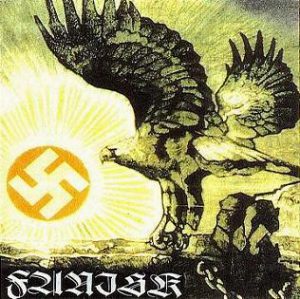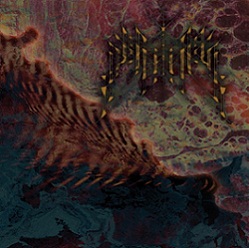
Article by Doron Rosenberg
It would certainly not be far from the mark to say that Fanisk are the crowning achievement of “NSBM.” The limits reached by Eldrig’s sublime compositions, tempered by the conceptual direction given by Vitholf, far exceeded anything that came either from the “NS” or the “US” camps, altogether escaping the cliched definitions of either. That is, as music, Fanisk fits neither of the pseudo sub-genres in quesion, and only belongs to either by dint of their ideological sponsoring and geographical location.
As far as music produced largely by underground and synthetic means, the music here far exceeds any other metal projects both in profoundity of concept and in musical realization. In here we must necessarily include Sort Vokter, the drug-fueled forest fantasy induced project by talented Norwegian underground artists, which introduced the listener to an intense appreciation of the natural landscape through mistifying distortion. Fanisk, on the other hand, elaborates with absolute clarity and stalwart acumen, producing a the aforementioned mistifying through harmonic progression and melodic completeness.
While Eldrig went on to make more music inspired of clearly in-depth esoteric concepts far beyond “Nazism,” the music simply was not up to par with the grand, dignified arrangements and structures created for Fanisk. Those of us who have at least seriously glanced through a work or two by Miguel Serrano would find it acceptablewithout assuming more about the music or the musicians behind it than what is directly implied by the words used, to describe Fanisk as the black metal manifestation of the same spirit. For what we find here is nothing less than the highest and most insightful conception of an Esoteric National Socialism (or Esoteric Hitlerism, in the case of the aforementioned author).

Die and Become (2002)
Here is the promising debut that opened Fanisks short but dense catalogue. This music is lush and grand, inspired and highly melodious, with passages where a true play of foreground and background in the classical European style was adopted into and in the midst of an annotating black metal aesthetic. If there is a sin to be found anywhere it is in the palpable sensation that the band clearly lost itself in the music they were making. While each track is directed and its parts defined functionally as well as completed inwardly, the final arrangement of each of these sections would seem not to be able to manage their weight appropriately. The result is that even though most of the material here is great, in evocation and in musicality, it swallows itself up, not knowing wherefrom and whereto this surge of power.

Noontide (2003)
A second incursion by Fanisk sees them applying the previously expounded exercises in composition, with amazing results that escape the imagination or encapsulating power of those who would detract from exemplary metal composition on thinly veiled ideological bases —and ultimately fear— excused by a poor exposition of “musical” criticism. Contrasting anything that would have been traditionally praised in the underground Texan milieu, the music here boasts of patience, elaborate conscious development of harmony and theme supported by contrapuntal movements. To be sure, much of this is not done strictly in the metal way, but it is nonetheless made to coalesce even with the electronic drums and strident guitars that do the job of completing and adding to the music. Throughout the album we find incredibly elongated melodies that echo the way in which classical music melodies are built, with an accompaniment that creates shapes under it and supports the movement of harmony. What we hear here, contrary to the blundering commentary of the embarassingly ignorant and superficial previous review of the album on DMU, which was in essence a smear job, has absolutely nothing to do with Summoning, and even less with Deathspell Omega. The listener must have patience and an attentive mind to even begin to appreciate this masterpiece where each section has a strict function and a self-contained, full expression. This is a music of tides, inward and outward flows, of full breaths here and sharp excitement there, and in which every moment arises seemlessly from what comes before in an inevitable, cyclic evolution.

Fanisk – Insularum (2013)
Ten years elapsed since the previous album and the most noticeable difference is the quality of the recording; more precisely, the sound materials recorded. The drums even sound real, not to mention the guitar, which still sounds digitally processed. The music has taken a turn towards the explicitely “prog” in the power metal vein, with heavy nods to the style of bands like Pagan’s Mind. The music is much more varied and explicitely “happy,” with very little contrast around it. On the upside, there are mysterious synth ambient incursions toward the middle of the album, the only persisting problem is that it is difficult to see how this is all connected. Both music-wise and character-wise, it was clear that this was the death of Fanisk.
Tags: 2002-2013, Black Metal, die and become, fanisk, insularum, Noontide, nsbm


Question!
Ildjarn is Norwegian? Is that like how Fenriz is also Norwegian?
I think we first must define what constitutes this “Norwegian”.
I guess I missed what I wrote. I hear Fenriz has parents of a Norwegian and a Swede. Never heard about Ildjarn, but the article points out Sort Vokter is a Finnish act, though wasn’t it recorded in a Norwegian university campus?
This wasn’t a jab at Fen-Fen claiming to be Argie?
Fanisk “sins… power.”
I’ve found the most complete statement of life in Homer’s poems and that too leaves on a cliffhanger. I’ve not listened to Fanisk’s works so I don’t know how much more complete of a philosophy their second work is to the first. I’ll give it a listen. Interesting review!
I bet Sammath could kick their ass, yo, just a heads up.
Fanisk and Sammath: apples and burritos sort of comparison.
Sammath does kick everyone’s assessed here, yo.
Hell yes. While the dismissal of Insularum and Eldrig’s solo works are completely baseless (Mysterion and Everlasting War Divinity are two of the handful Metal albums I would consider to be flawless, and I consider Insularum to be the zenith of Metal as an artform) it is great to finally see some proper recognition of this masterful project on this site.
They are not baseless. I gave a specific but short reason why Insularum has problems. Don’t come here half reading and talking shit.
Sir, (while I realize the irony of typing these words on this specific site) there is no reason for such hostility. I commend you for finally bringing a positive spin on my favourite Metal band to my favourite Metal-related site, and am overall pleased with your article and my comment was not intended to come off as incursive as it apparently did.
However I do find your criticisms of Insularum to be disappointingly vague and/or shallow in nature, especially compared to your relatively in-depth analysis of Noontide. Since you are accusing me of “half-reading” I shall attempt to address your criticisms point by point.
“The music has taken a turn towards the explicitely [sic] “prog” in the power metal vein, with heavy nods to the style of bands like Pagan’s Mind.”
This is the least objectionable criticism, although arguably it’s not so much a criticism as a neutral description of the style. I suppose to a certain extent this is a matter of taste. Admittedly my two favourite genres of Metal are Black Metal and Epic/Heavy/Power Metal in the vein of Iron Maiden, Fates Warning, Lost Horizon, Manilla Road, Virgin Steele, etc. so naturally music such as this which somewhat blends the spirit of both will personally appeal a great deal to me.
I will add however that there has always been a very heavily “progressive”-influenced nature to Eldrig’s compositions, and (while this comment is not directed at you) I also feel like adding that I always found it interesting that a common complaint towards Noontide is that there’s “too many keyboards and not enough guitars, it’s almost not Metal”, and yet the the later works and their Metallic guitar-driven spirit end up being entirely ignored by said critics.
” The music is much more varied and explicitely [sic] “happy,” with very little contrast around it. ”
I’m sorry but this is kind of retarded. If I read this description without listening to the album I would have imagined it sounded something like Gamma Ray. To say there is no contrast or change in mood and tone throughout this album is patently absurd and almost makes me wonder if you have actually properly listened to the album in question. The overall spirit of the album is indeed of a highly “positive” and triumphant nature, but it’s certainly not merely superficially “happy” and is more akin to a transcendental and masculine vir-like spiritual overcoming. Perhaps DSBM, Blackgaze, Grunge, Indie Rock and similar mopey and “unhappy” genres would be more your thing if you find such sentiments expressed within Metal to be objectionable.
“…the only persisting problem is that it is difficult to see how this is all connected. ”
lol. Hint: The Track Titles
“Both music-wise and character-wise, it was clear that this was the death of Fanisk.”
It sacrifices itself, as it consecrates itself in a flaming death, in order to be reborn. For this reason it was
called the Fanisk…
You should have just written this the first time instead of being a little passive aggressive girl about the injustice of the previous assessment maybe this is why nobody takes you seriously in life you fucking gay ass punk >:)
lol, Fanisk. Ah, yes, you can tell this is supreme metal arts in good taste, with fantastic cover art and drum machine. I cannot wait for the manifold graces of the pagan lands to speak to my soul while I take a bubblebath.
There is nothing wrong with using a drum machine, and although the covers may not be to your liking either, neither of those things have a bearing on the quality of the music itself.
drum machines are gay real music real instruments unless not possible
Don’t be stupid. Good music comes honest portrayals of clear visions by any means necessary. All tools are valid in art. The intent and execution are what dictates quality.
right so lets use auto tuned for singing and other similar tactics see i do believe what you said the intent and execution are what dictates quality. but when it comes to metal especially they needs to be human connects and a touch with reality not all just made 2D on a computer never coming into the real world. so i don’t believe the “any means necessary” however if the composition is good the i guess it does not become invalided by a drum machine alone but let me put it this way what is more impressive to you being the best playing in a fighter video game or being the best fighter in real life? i find it hard to connect with electronic music for example because to me it mostly sounds like a bunch of faggot computers noise and super robotic making music loose the human reality touch in favor of sounds only
One needs to be able to set aside their aesthetic preferences in order to assess the quality of art. And the real life fighter vs. Video game fighter is a weak analogy. A real life fighter is accomplishing entirely differently goals than someone who plays video games whereas someone making music with drum machines and synths vs.someone massing music with acoustic kits and guitars only are still working towards goals within the same vicinity. Something like hand to hand or knives vs. Guns would be much more applicable, to which I would argue that fighting is fighting and intent and execution are, again, what dictate the outcome.
yeah cmon man, the terrible cover art has nothing at all to do with the less terrible music that has nothing at all to do with using a drum machine.
Noontide is a neo-classical metal masterpiece, my pale ass nikkka.
Fanisk doesn’t go far enough in politics to have them detract (or otherwise) from the music. This is world wise ethno-metal.